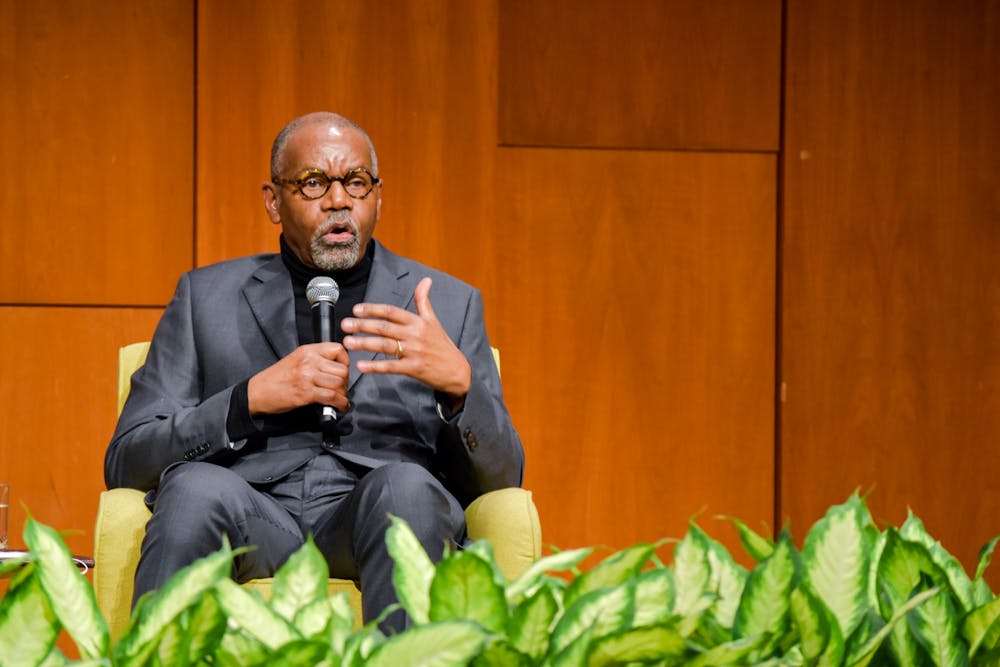As part of the question and answer portion of the annual Martin Luther King Jr. lecture, Elfred Anthony Pinkard, president of Wilberforce University, asked the audience to stand up if they have a relative, colleague or important member from their community who attended a Historically Black College and University or have read something influential by someone who went to an HBCU. A majority of those in attendance rose from their seats.
In Brown’s 2022 Martin Luther King Jr. lecture, Pinkard spoke about the public perception of HBCUs in the past, present and future. In addition to Pinkard’s keynote address, the event featured musical performances from the Harmonizing Graces — Brown’s gospel choir — welcoming remarks from Provost Richard Locke P’18, an introduction from graduate student N’Kosi Oates GS and a discussion led by Sylvia Carey-Butler, vice president for institutional equity and diversity.
Pinkard, who has experience working at six HBCU institutions and who describes himself as “consumed by HBCUs,” presented an argument, based in historical context, of how HBCUs came to generally be viewed as “subpar, marginalized and unworthy of support and celebration.”
He explained that an article about HBCUs written in 1967 by Christopher Jencks and David Riesman — who both went on to become professors at Harvard — set forth the notion that “academic achievement was antithetical to HBCUs,” beginning the dangerous “single story” he alluded to throughout the lecture.
“It shaped the public perception of HBCUs for generations to come,” Pinkard said. “I would suggest that with few exceptions, in the public’s imagination, this notion of HBCUs as being marginal institutions still exists.”
The impact of a degrading, stereotypical story can be harmful, Pinkard said.
“There are few things as soul-crushing as being unseen or seen in ways that belie the truth of who we really are,” Pinkard said.
Pinkard challenged this narrative by highlighting the role that many Black scholars like W.E.B. Du Bois played in creating a robust “intellectual footprint at HBCUs.”
“Within the HBCU community, there were always aspirations for greatness and the notion that these institutions were alive and should exist for a purpose that was meaningful and game changing and visionary and, in some ways, audacious and disruptive,” Pinkard said. “This tradition of intellectual gravitas at HBCUs seems to have been lost in the public imagination.”
He also emphasized the unique role and opportunity that exists with the presence of HBCUs.
“African Americans are the only racial (or) ethnic group in this nation that have 107 institutions of higher learning that were developed especially for their education,” Pinkard said. “The intellectual power resident in those institutions should be galvanized in full force to address all of the issues that face the African American community and, by extension, other communities of color.”
Pinkard noted that HBCUs have consistently faced systemic challenges, including “underfunding and neglect.”
“It is exceptional that HBCUs have done so much with so little,” Pinkard said. “That is a critical part of this story: their power and magnificence by punching above their weight.”
He said he believes that part of reimagining the narrative includes increasing funding for all HBCUs. Pinkard cited the fact that a number of HBCU institutions recently received large philanthropic donations, which has already been “game changing.”
“Every one of them has earned the right of doing more with more and expecting access to resources and funding historically unavailable to these institutions,” Pinkard said. “Imagine what we can do with (more) resources.”
Pinkard closed his lecture by emphasizing the key role that HBCUs will continue to play in the sociocultural fabric of American higher education.
“The contemporary HBCU is redefining purpose in the 21st century and beyond, and in so doing, we are writing a richer, truer narrative about who we are and how we are capable of contributing to the American story of higher education,” Pinkard said.
Correction: A previous version of this article incorrectly lowercased the "K" in N’Kosi Oates’s name. The Herald regrets the error.
Dana Richie is a senior staff writer for Arts and Culture and the photo chief. She enjoys using multiple forms of media to capture peoples’ stories and quirks. In her free time, she loves knitting, learning about local history and playing ultimate frisbee.





